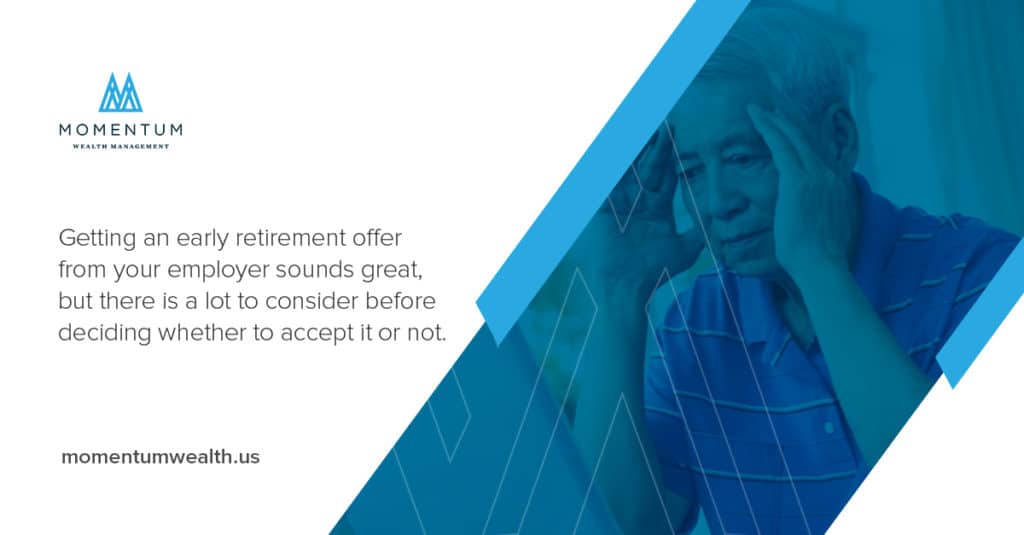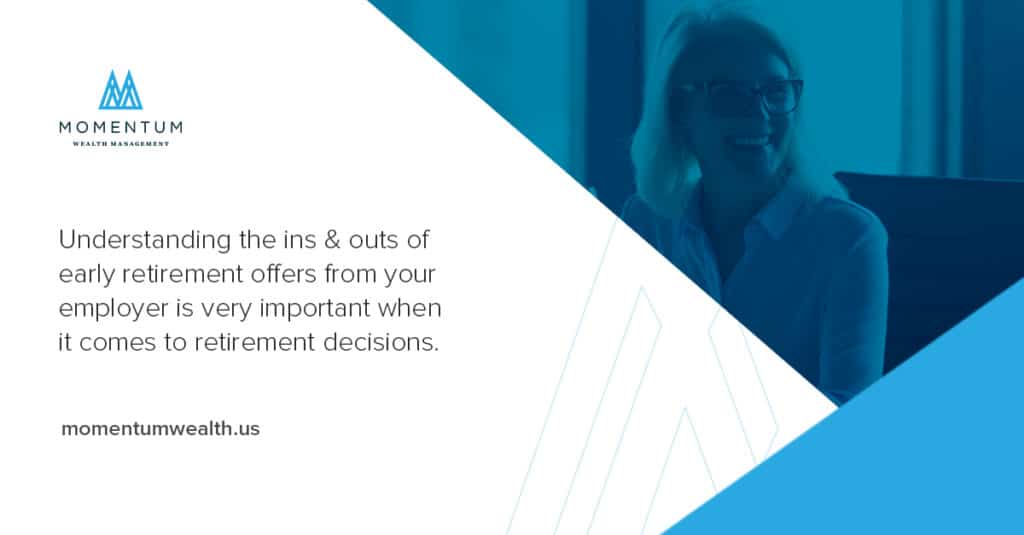When companies in different industries face uncertain futures due to an economic downturn, they may need to cut expenses to stay afloat. Cutting expenses can take many forms, including furloughs, payroll reductions, and even forced layoffs. In some cases, companies may also make early retirement offers to certain employees. If you have received an offer from your company to retire early due to the pandemic or other factors, there are a few questions to ask in order to make the best decision possible.
What Is an Early Retirement Buyout Program?
One type of early retirement package is called a retirement buyout program. This is typically offered to employees who are a bit older and close to retirement already. This type of retirement buyout offer usually involves a compensation package that encourages these employees to consider retiring earlier than planned. An employer who is seeking to cut costs due to economic stressors may choose to encourage highly compensated employees to consider early retirement first. For an employee, an early retirement buyout offer can help you financially bridge the gap of your remaining years until you officially retire at the full retirement age.
Why Do Some Companies Encourage Early Retirement?
Offering early retirement is a popular option for some companies. They may have been impacted by the effects of the global pandemic or maybe just looking to cut costs for other reasons. They can often save a lot of money in the short term by encouraging some employees to retire early. They may also offer early retirement packages to address long-term financial goals. When an employer offers early retirement to an employee who has been with the company for decades, the company may then be able to fill the position with a younger, less costly worker. Companies may look to early retirement packages as a way to introduce newer, younger employees to their growing workforce.
What Is Typically Included in an Early Retirement Package?
Oftentimes, an early retirement buyout program will involve a severance package. A severance package is typically calculated based on a combination of your annual salary and the number of years you have been with the company. For example, a company may offer severance pay to an employee equal to one month’s salary for every year they were with the company. Severance pay is not mandated for early retirees, though it is customary in most early retirement offers. Severance payments also tend to be higher for higher-level positions within a company, including executives and senior managers.
Sometimes employers will also have a company pension plan. This may allow them to award you with payments for additional years of service that can increase your eventual pension payouts. You should also talk to your employer about if the early retirement offer can include payouts for any unused sick leave and vacation days.

A buyout package may also include continued benefits like health care. However, the rising costs of health insurance have caused many companies to shy away from including continued health care coverage to their retirees. If an employer does include health care coverage in the retirement plan, you should find out exactly what this coverage entails and for how long it covers you. You may also want to negotiate for health care coverage if your employer offers an early retirement package where this is not included.
No matter what type of retirement plan you’re offered, a strong early retirement package should include a significant income supplement. This will help you stay financially stable until you reach age 65 and can opt into other benefits and health care options.
Should You Accept an Early Retirement Offer?
Deciding whether or not to accept an offer to retire early will depend on a lot of things. A company may offer voluntary early retirement offers to certain employees. These can have both benefits and drawbacks for the employee. An early retirement offer may sound like a fantastic option at face value. It has continued health benefits and annual payments. It may also include a lump sum bonus and added years of service for pension benefits. If you are close to retirement and have reached your savings goals, then this choice may be simple. This type of offer could also help you be in better financial shape for retirement than if you waited to retire. When you receive an early retirement offer, there are three key factors to look at before you accept or deny an early retirement package. These include your age, your retirement assets, and your health insurance options.
Age of Retirement
Early retirement typically occurs before the age of 65. If you are in your late 50s or early 60s, the charm of retirement may be tempting. However, when you retire early, you will need a bigger retirement nest egg than if you were to retire at 65 . It’s vital that you make sure you are able to support yourself financially for a longer time period.
Retirement Assets
If you accept an early retirement offer, you need to have a firm grasp on managing your finances. Your 401(k), individual retirement account (IRA), or any other retirement accounts should be overseen by a wealth management expert. Each type of retirement account will have its own regulations and caveats, some of which are based on the age at which you choose to retire. Certain types of retirement accounts come with early withdrawal penalties that can impact your long-term net worth.
Choosing to withdraw money early from your retirement accounts can limit the growth of your savings. This is because a percentage of that account will now shift to spending instead of saving. When it comes to assessing your retirement assets, you should speak with wealth management specialists. They can help you understand what type of retirement accounts you have and need. They can also help you understand what the restrictions and penalties are regarding early retirement age. Finally, they can assess whether or not your current portfolio can handle fewer contributions than originally anticipated.
Health Care Options
When planning for early retirement, you must consider your health care options. Medicare insurance coverage does not begin until age 65, so if you retire before that age, you will need to get coverage elsewhere. A huge plus of some early retirement packages from employers is if the package includes health coverage. Costs of medical insurance in the US are on the rise, which can impact your expenses if you choose to retire early.
Perhaps your company offers an early retirement option that includes medical coverage. This type of perk may be what helps you make your decision. COBRA, the Consolidated Omnibus Reconciliation Act, allows for your health coverage with your employer to continue for up to 18 months. Your employer does not have to cover the cost of rising premiums throughout that time period, however. COBRA is only a requirement for companies that have more than 20 employees.
What Does It Mean To Be Vested?
A retirement account that is employer-sponsored means that your employer may make regular contributions. However, whether you have immediate access to those funds or not depends on the vesting schedule. Vesting refers to your right to access the funds contributed by your employer in your employer-sponsored retirement account. Some employers offer immediate vesting, which means their contributions become yours right away. However, many employers follow a cliff-vesting schedule or a graded vesting schedule. A cliff-vesting schedule means you will be vested after a certain number of years of service to the company. A graded schedule involves a percentage with each year of service. Knowing what type of account you have plays a big role in your ability to retire early.
How Does Early Retirement Affect My Retirement Assets?
If you are fully vested with your employer-sponsored 401(k) plan, then that money is completely yours. If you choose to retire early, you may want to consider rolling that 401(k) into an IRA or Roth IRA. Additionally, if you take an early retirement package, you may also be able to avoid the 10% IRS penalty for withdrawing from your current employer’s 401(K). You will still be expected to pay income taxes on any withdrawals, but you will be able to access funds sooner this way.
If your employer offers a pension program, you might be concerned that early retirement will affect your monthly benefits. Pension plans typically factor in how long you have been with the company, so leaving early may impact your monthly payments. In some cases, your employer may offer you additional years of service to help you avoid a reduction in monthly pension benefits.
Does an Early Retirement Package Affect My Social Security Benefits?
Choosing to accept an early retirement plan from your employer may impact your Social Security retirement benefits. Social Security is based on your highest-earning salary for 35 years of working. If you retire before working the 35-year mark, your monthly Social Security benefits may decrease.
Let’s say you work for 30 out of the 35 years. This cuts two ways. First, you will receive smaller Social Security payments. Second, by retiring early you will need to cover expenses for a longer period of time. Talk to a financial advisor about your best options for when to start taking Social Security and to find out more about your eligibility.
Keys to Success for Early Retirement
If you’re looking over an early retirement package from your employer, you need to put your personal and financial needs first. You may want to break down the details of the retirement offer with a financial planner. This can help you understand all the specifics. You also need to think about any downsides of not accepting the offer. Consider your health care coverage and extra expenses you may have to deal with. If you start planning and saving ahead of time and practice frugal financial choices, you can set yourself up for success in retirement. However, it is important to be realistic about your financial situation and whether or not you have the retirement finances in place to help you retire comfortably.


